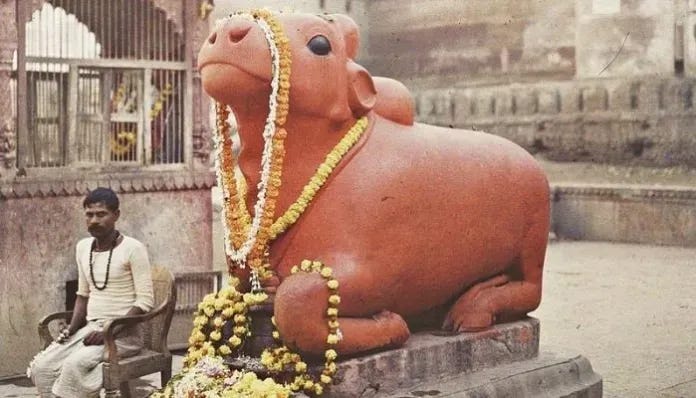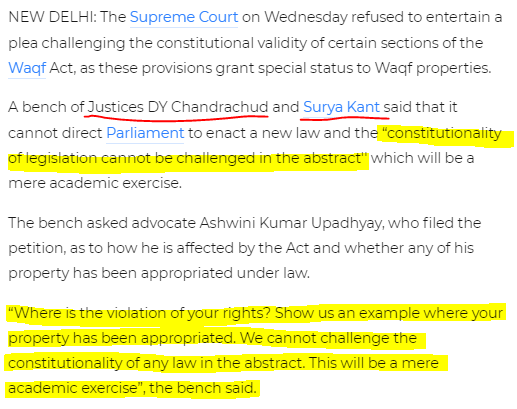Manthan - Gyanvapi Case, Waqf Act and Uniform Civil Code
The Gyanvapi case is being heard. Two important points have been raised by the Varanasi Court. One informs the PIL on Waqf Act 1995. All these may impact the Uniform Civil Code. Its convergence time.
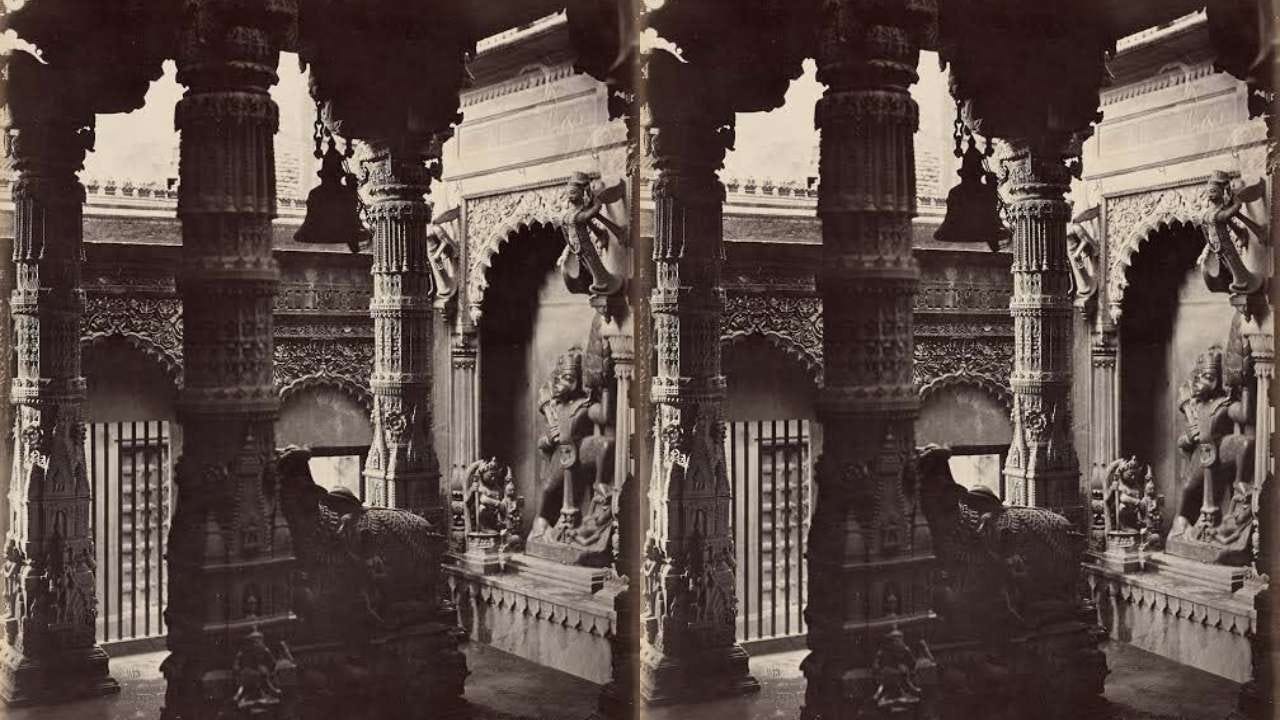
The Places of Worship (Special Provisions) Act, 1991 has been seen as a major hurdle to normalizing the conversion of Hindu temples from so-called mosques by the Islamic invaders to their original state in India. This is what it states.
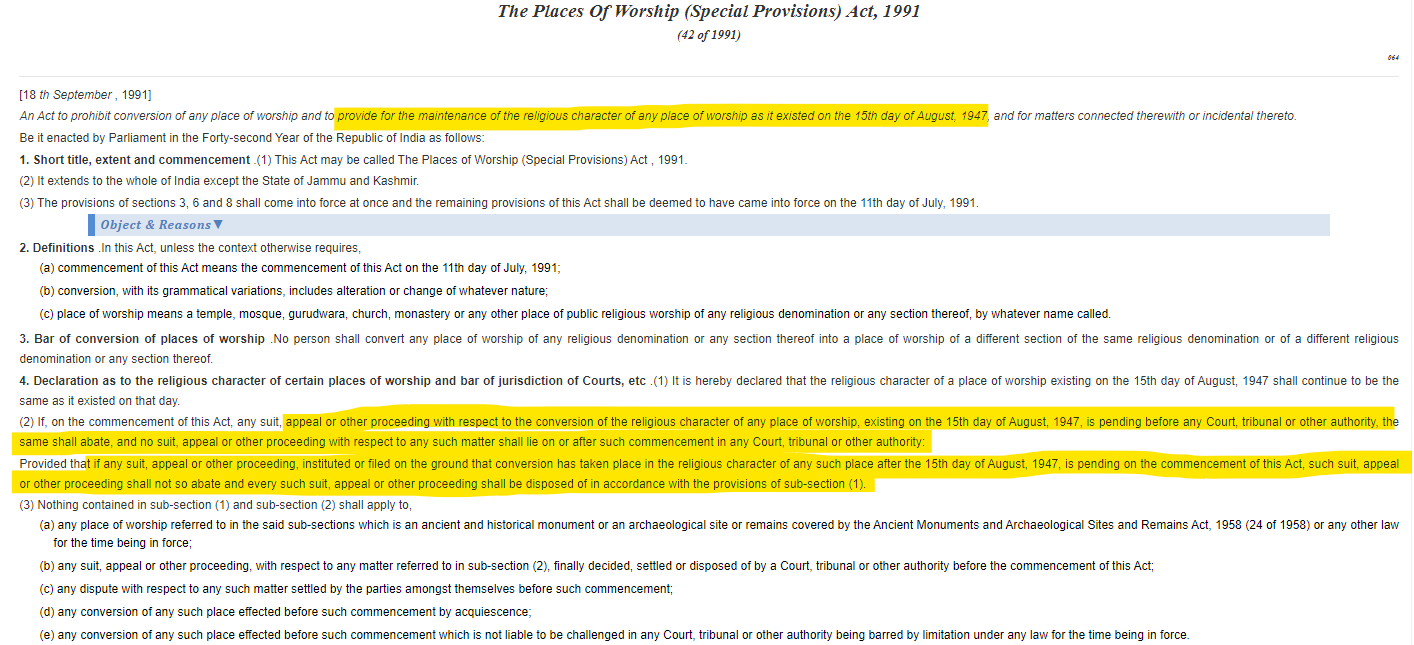
Basically, if the worship was going on by a group post-1947, then that right could not be taken away by the Places of Worship Act, 1991.
The Gyan Vapi case petitioners argued the core of the Places of Worship (Special Provisions) Act, 1991.
The cut off date.
IN fact , worship of the Shivling was going on at the Gyan Vapi structure until 1993.
Regarding the applicability of the Places of Worship (Special Provisions) Act, 1991 as a bar to the suit filed by the Hindu women worshippers, the Court specifically held that since the Hindu Worshippers claim that the Hindu deities were being worshipped by them inside the masjid complex even after August 15, 1947 (which is the cut off date provided under the Places of Worship Act), therefore, this act will have no applicability here in this case. (Source: Livelaw)
And that is precisely what the court has observed.
In its 26-page order, the court observed that the plaintiffs were worshipping at the disputed place “incessantly since a long time till 1993. After 1993, they were allowed to worship the above-mentioned Gods only once a year under the regulatory state of Uttar Pradesh. Thus, according to plaintiffs, they worshipped… at the disputed place regularly even after 15th August 1947.” (Source: FirstPost)
When the Supreme Court bench gave the Ramjanmabhoomi-Babri Masjid verdict, it had said the following.
“In providing a guarantee for the preservation of the religious character of places of public worship as they existed on 15 August 1947 and against the conversion of places of public worship, Parliament determined that independence from colonial rule furnishes a constitutional basis for healing the injustices of the past by providing the confidence to every religious community that their places of worship will be preserved and that their character will not be altered.” “The Places of Worship Act imposes a non-derogable obligation towards enforcing our commitment to secularism under the Indian Constitution. The law is hence a legislative instrument designed to protect the secular features of the Indian polity, which is one of the basic features of the Constitution…” (Source: FirstPost)
The argument from the Supreme Court is cute. But strangely one-sided. How is healing for everyone possible when the interests of only one side of the spectrum are secured? What Supreme Court was really saying is "providing the confidence to the Muslims (every religious community) that their places of worship will be preserved.
For, surely as has been amply demonstrated time and again, the Hindu community has little confidence in this law or the narrative by the honorable Court. What is even more egregious is that the Court starts by saying that this locking of any future changes was a way to "healing the injustices of the past".
How?
By shutting them up?!
So the way to heal a victim of genocidal crimes is to take away every tool at his disposal to seek justice? Make silencing the victim of genocide as benchmark of justice to him?
Now, that's one heck of an innovative way of defining Justice! Ain't it?
Crimes are bad enough. But when Justice not just obfuscates that crime but goes on to gaslight the victim himself, then you know that you are in the firm territory of fascist criminality.
It is to challenge the Places of Worship (Special Provisions) Act, 1991, that the judges eulogized in their Ayodhya verdict, that Senior Advocate Rakesh Dwivedi decided to challenge on the behalf of his client Ashwini Upadhyay.
Interestingly, after deleting it from the list of business SIX times, a bench headed by Chief Justice NV Ramana finally took note and agreed to hear the plea on September 9, 2022.
Upadyay shared the same angst in his plea that we shared of the genocide victims that we shared above.
The PIL claims that the provisions of the law "not only offend Articles 14 (equality), 15 (that prohibits discrimination of Indians on basis of religion, race, caste, sex or place of birth), 21 (protection of life and personal liberty), 25 (freedom of conscience and free profession, practice and propagation of religion), 26 (freedom to manage religious affairs) and 29 (protection of interests of minorities), but also violate the principles of secularism, which is an integral part of the Preamble and the basic structure of the Constitution". The PIL contends that the Centre has barred the remedies against illegal encroachment on places of worship and pilgrimage of Hindus, Jains, Buddhists and Sikhs, who cannot file a suit or approach a high court. (Source: Business Standard)
On September 9, 2022, the Supreme Court gave the Center two weeks to file its response.
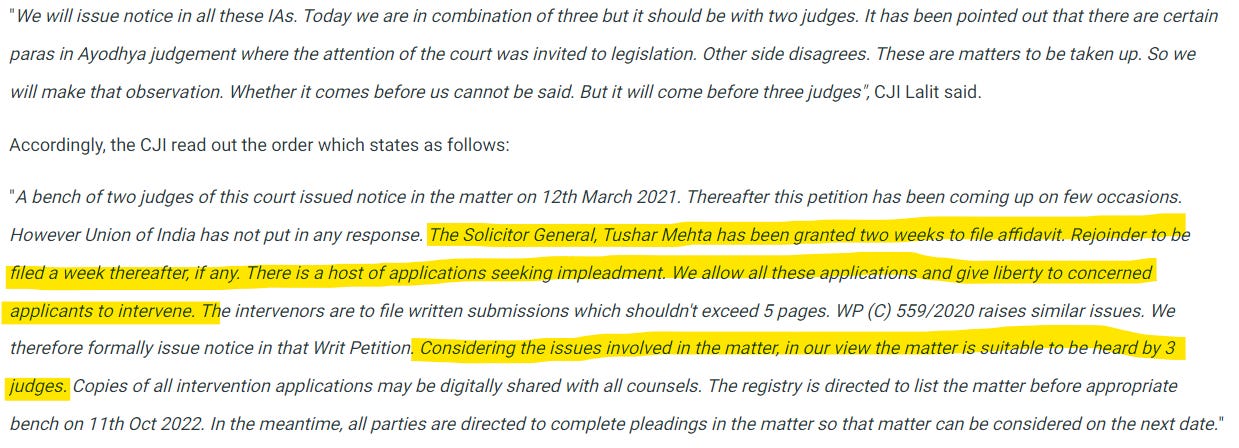
This sets up two different issues being hit at once.
The entry into the arena of the Kashi Vishwanath Shivling and the challenge to the Places of Worship (Special Provisions) Act, 1991.
There was another important point in the statement by the court - Section 85 of the Waqf Act will not apply.
In its order, the Court also observed that the bar under Section 85 of the Waqf Act does not operate in the instant case because the plaintiffs are non-Muslims and strangers to the alleged Waqf created at the disputed property and relief claimed in the suit is not covered under Sections 33, 35, 47, 48, 51, 54, 61, 64, 67, 72 & 73 of the Waqf Act. Hence, the suit of the plaintiffs is not barred by Section 85 of the Waqf Act 1995, the Court held. (Source: Livelaw)
Waqf Act 1995 is a draconian Act that hits at the very heart of India's Secular character. Its provisions are dangerous in how they allow Waqf Board to usurp any land.
There are the specific clauses in the Waqf Act 1995, which was further amended that have the potential of enabling the Islamic institutions to subjugate and hurt every other community in India.
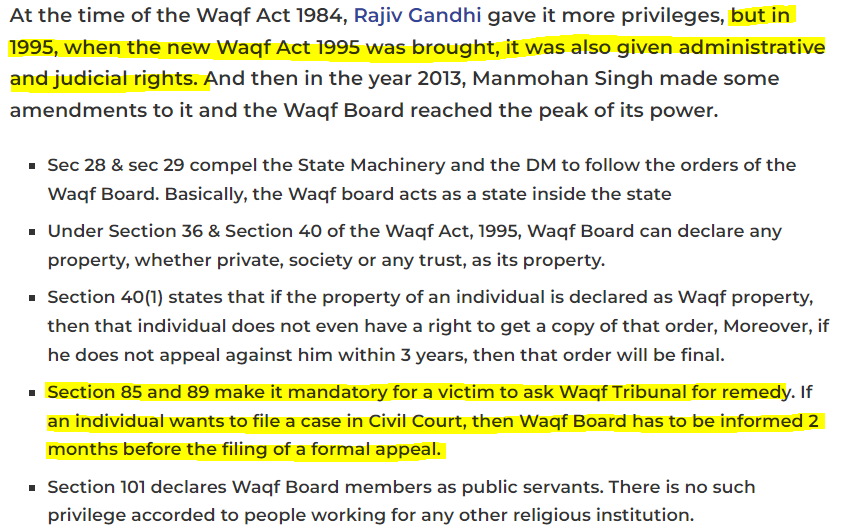
That dark and evil intent of the law is now playing itself out in Thiruchenthurai village near Trichy. The case is shocking.
A shocking case of the Waqf Board encroaching on a property has come to light in Tamil Nadu, where an entire village with a Hindu majority population has been declared as waqf property. Thiruchenthurai village near Trichy, Tamil Nadu has been designated as a waqf property by the Tamil Nadu Waqf Board. Thiruchenthurai is a village situated on the south bank of the Cauvery river in Tamil Nadu. The issue was uncovered when a person named Rajagopal attempted to sell his 1 acre 2 cents of land to one Rajarajeshwari. When Rajagopal, a resident of the nearby village Mullikarupur village arrived at the Registrar’s office to get the sale of his land registered, he was surprised to learn that the land did not belong to him and instead belonged to the Waqf Board. (Source: "Tamil Nadu Waqf Board claims ownership of a Hindu-majority village, registrar asks villagers to obtain NOC from the board to sell their own land" Opindia)
Here is the tweet from the Dinamalar magazine about the story it ran, which was picked up in the rest of India to make it viral.
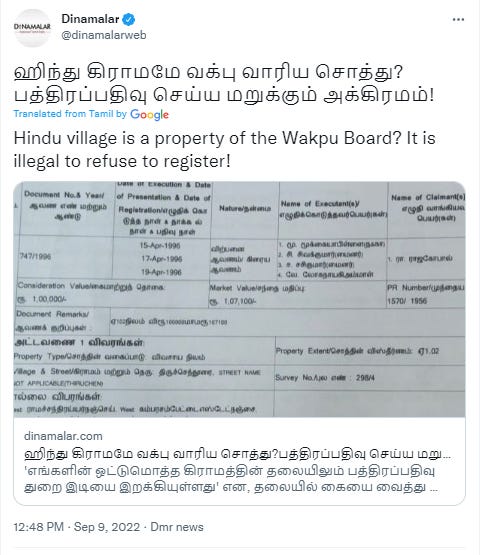
When Ashwini Upadhyay files a PIL in the Supreme Court [WP(C)1080/2021], the bench consisting of Justices Chandrachud and Suryakant refused to even entertain the plea o April 13, 2022.
On April 20th, 2002, however, the Delhi High Court admitted the plea and heard the matter.
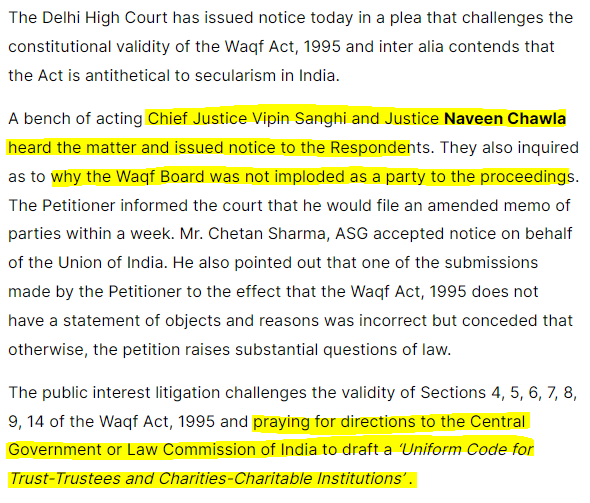
The Delhi High Court bench asked the Central Government to file its response. Please note that one of the issue addressed by Advocate Upadhyay was the Uniform Civil Code.
Delhi High Court on Thursday sought the stand of the Centre and Central Waqf Council on a public interest litigation seeking to declare that the Waqf Act is in violation of the Constitution and that private properties of citizens can only be governed by a uniform civil code (UCC). (Source: Times of India)
The next date was set for July 28th, 2022.
On that day, the Central Government sought another 4 weeks. The court scheduled the next hearing for November 4th.
The Central government on Thursday sought four-week time from the Delhi high court to file its response on the public interest litigation (PIL), challenging the constitutional validity of The Waqf Act, 1995. The next hearing is scheduled to take place on November 4. The petition, filed by BJP leader and advocate Ashwini Upadhyay, argues that the Act is against the secular spirit of the Constitution. On April 20, a division bench of then Acting Chief Justice Vipin Sanghi and Justice Navin Chawla issued notice to the Central government, asking it to file its response. Nothing that Upadhyay had not impleaded the Waqf Board even though he had challenged the Waqf Act, the court had asked him to make Waqf Board a party to the case and had issued notice to them as well. (Source: New Indian)
The first salvo has been fired against the Waqf Act 1995 (specifically the Section 85) in this court in Varanasi basis the Gyan Vapi case.
What is extremely interesting is that multiple issues and cases are converging together:
Gyan Vapi Case
Waqf Act 1995
Uniform Civil Code - which is what Ashwini Upadhyay had argued for in his plea.
And, it is all happening now.
If you like our content and value the work that we are doing, please do consider contributing to our expenses. CHOOSE THE USD EQUIVALENT AMOUNT you are comfortable with.
If you like this post - please share it with someone who will appreciate the information shared in this edition.
Today’s ONLINE PAPER: Check out today’s “The Drishtikone Daily” edition. - THE DRISHTIKONE DAILY




